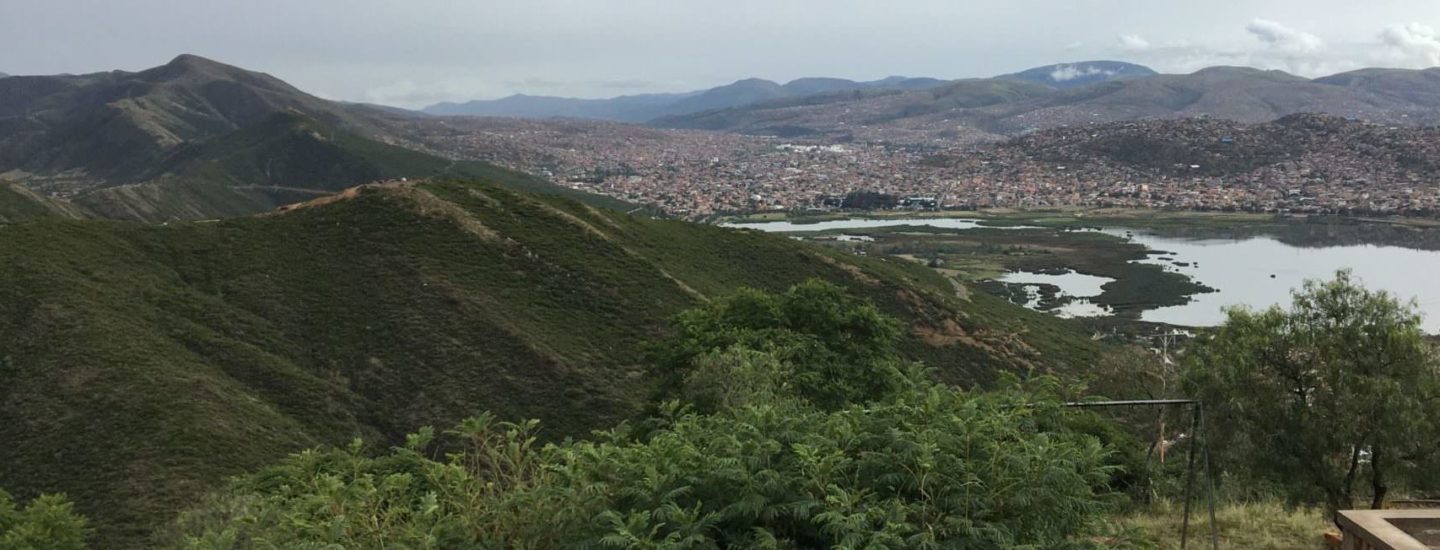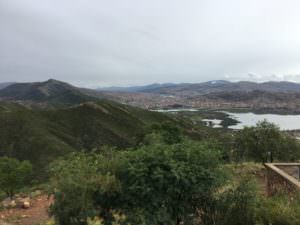Honestly, a Continuous Work in Progress

Editor’s note: Missioner SarahJane reflects on her personal privileges and what that means while serving others in a different part of the world.
“We don’t go to the margins to make a difference. We go to the margins so that folks at the margins make us different.”
“We want to bridge the gap that exists between people. Even in service, there is a distance: ‘service provider—service recipient.’ Service is where we begin, yet it remains the hallway that leads to the ballroom. The ballroom is the place of exquisite mutuality… Truth be told, we are all in need of healing; we are all a cry for help. The affection of God unfolds when there is no daylight separating us.”
– Father Gregory Boyle, SJ
The beginning of this prayer by St. Francis has echoed in my ears since the day I stepped off the plane in Cochabamba: “I am a stranger traveling in a brutal, yet wondrous land…” Although I would replace “brutal” with a sentiment more like “outside my comfort zone,” the meaning remains true for me. I am but a foreigner stepping on sacred and holy ground. And, with my still infant, one-year-old roots exploring just the topsoil, I continue to ask myself: “Why have I come?” I doubt this questioning will truly ever cease, and in all honesty, I do not want this gnawing question to ever leave, as it keeps me conscious and vigilant in my attitude and actions.
Some of the most challenging moments I have faced in my experiences here have been the personal self-realizations I have made and that have been reflected back to me. For example, continuously realizing just how deeply my own savior-complex is embedded as I contemplate just why I am here. And with that, I am also continuously awakening to the parts of myself that I thought I had worked out, parts of me that want to answer that question with an impulse to fix, to help, to fill a need, to right a wrong, or to give a good.
Sometimes, this happens subconsciously, but sometimes I also catch myself at Nuestra Casa searching for an opportunity to take the lead in a situation that I admittedly do not fully understand in order to “fix” or “serve.” Sometimes, I outwardly label this “commitment to the community,” and this often happens when I experience an internal sense of responsibility to “make a difference,” “have an impact,” or a “make a change.” I am embarrassed to admit this. I feel called out and seen by the words of Parker Palmer when he refers to “a gift given more from my need to prove myself than from the other’s need to be cared for.” He continues in Let Your Life Speak, “That kind of giving is not only loveless but faithless, based on the arrogant and mistaken notion that God has no way of channeling love to the other except through me.”
I connect the dots of my deeply entrenched savior-complex to the privilege I have experienced and continue to experience. As a white middle-class woman from North America, I was afforded a high-class education all the way through university –one of the many advantages provided to me where others have lacked access. Due simply to the nature of where and to whom I was born, my whole worldview growing up was shaped to see out from a higher rung on the ladder, and thus, to also believe that everyone who had less was on a lower rung (and, dare I say, to also silently believe that these people were less…?).
Even after an intensive Formation program with FMS, deconstructing the perceptions I had about my own privilege and worldviews, and even after a year and a half striving to live in Franciscan minority, solidarity and accompaniment, resisting positions of power, being deeply humbled, and sharing life with those on the margins, I am still continuously uncovering my internal biases. I am still trying to remove a savior-complex that was built into the white wealthy status quo of North America. As I have walked this path of accompaniment at the hogar, I see how even a university degree–just one element of my privilege –shaped so much of my attitude entering the community here. My personal identification as “educated” pushed me apart from those who had so much to teach me. To counter this, I have tried to swallow doses of honest self-reflection and gentle self-compassion as I listen to those around me and as I try to heal from these poisons that have tainted my motivations, attitudes, and actions.
…
For so long, I thought that social change came from the top-down, rather than from the bottom-up. I thought it was those at the top with education and titles (a.k.a people who have power) who affected systemic improvement. But, like St. Francis himself, my whole understanding of the world has been totally turned upside down during my time here. So much of my own transformation and conversion has been watered, weeded, and pruned by the vulnerable relationships I have entered into. I owe almost everything to the women at Nuestra Casa who invited me into their community and have allowed me to take a seat at their table.
Tía Sofía, someone who has no formal higher education or advanced degree, is one of those women for me. She has been doing community social work in underserved communities for longer than I have been alive. She is one of the wisest women I know. She has been accompanying and guiding women on the margins of Bolivian society for the majority of her life. Without any diploma, acknowledgements, or accolades she has been humbly changing the lives of young women and girls in various communities across the country. She has personally taught me to be more patient, to share more selflessly, and to work with more hope.
Tía María*, another woman who has touched my life, works tirelessly and thanklessly at the hogar. She wears the hat of administrator, caretaker, development coordinator, peacemaker, conflict-resolver, and as a loving mother-figure for the girls. She models what it means to give and to receive – what true mutuality looks like. She celebrates her indigenous heritage and is proud of the modest village she calls home. She continues to teach me the importance of community and the passion it takes to fight for justice.
The girls, simply young pre-teens and teenagers, have utterly transformed me. Of the plethora of lessons I have learned from sharing life with them, the primary is their raw resilience. They teach me to dig for courage in the depths of ourselves, unlike I have ever had to do. They show me their resurrections every day as they choose to sing along to the radio while making breakfast; as they choose to invest in their future by studying; as they choose to smile at their faces in the mirror as they braid their hair; and as they simply heal and grow into themselves. To be in the presence of their resilience amidst their acute suffering is a privilege, to say the least.
While I may still be bound in by the high, tangled branches of white privilege, the branches are little by little being trimmed by witnessing the much larger work that is being done by the strength of the Tías and the courage of the girls, work that began before I arrived and that will continue after I leave. Their passion and commitment to the liberation of women and girls from violence is a transformative force. This has been the medicinal lesson I have needed: that stepping back and turning down the positions of power that could have so easily been handed to me—and are sometimes still pushed at me—allows me to grow close to, listen to, and learn from those whom the world has deemed as “small,” “unintelligent,” “uneducated,” and worthy only of our “aid.”
In this past year and a half, my perspective has been in a constant state of change. These changes are due to my admiration for the Tías, my deep love for the girls, my relationship with this community, my growing understanding of the power I possess, and my awakening to a lingering savior-complex. All sprinkled on top with constant spoonfuls of humility. While my ancestors’ history, society, and the status quo say to me: “Climb to the top of the ladder and there you will achieve, there you will ‘make a change!’” My community here has taught me something else, another opportunity, a different viable path:
Draw close to those that the world pushes to the margins. Do everything first with great love. There is room for everyone when I learn to share space, rather than dominate it. My voice is not the most important nor knowledgeable. The most important things are hope, faith, and love.
Returning to the prayer with which I began this reflection, we see that the full version goes like this: “Lord, I am a stranger traveling in a brutal, yet wondrous land – far from the promise of home, on a journey led by your hand to where the lion lies down with the lamb.” To where the lion lies down with the lamb. My community has been Christ for me, taking me by my hand, and teaching me to lie down.


